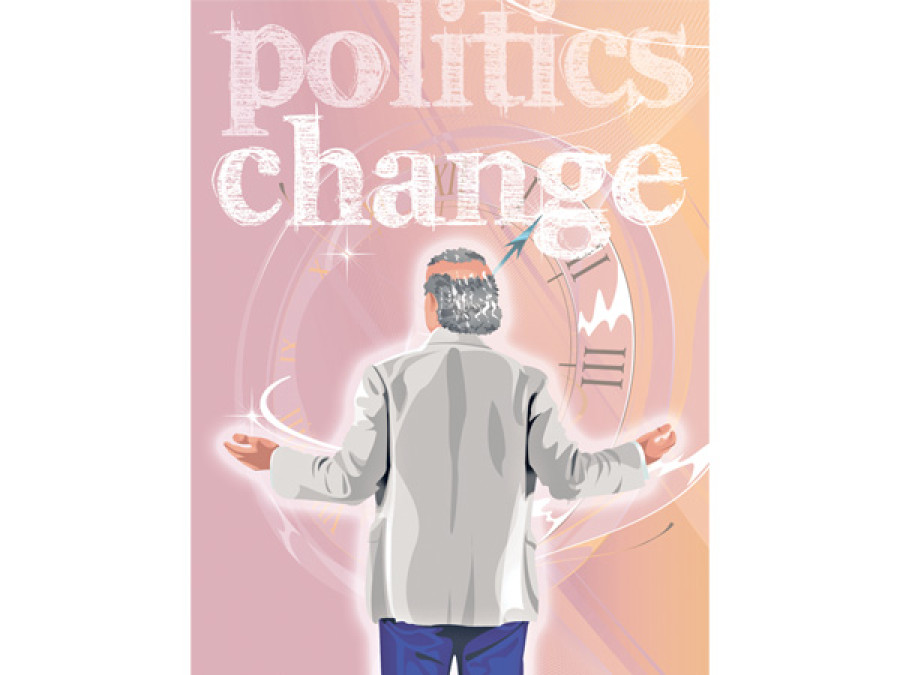Opinion
Stale political system
Successive prime ministers have not understood that creating robust systems and hiring competent teams is key to success
KP Sharma Oli became prime minister at a critical time. There is no denying that he faces multiple challenges that constrain his ability to perform. Yet these same challenges also offer him the opportunity to undertake reforms that can deliver tangible results for the public. As the first prime minister under the new constitution, he has tremendous opportunities, as well as the responsibility of establishing new political traditions and imprinting a new governance style if transformation of the country into a federal democratic republic is going to be worth the name. He could have put an end (he still can) to business as usual in many areas. But most importantly, there needs to be a thorough review of the failures of previous administrations. Previous prime ministers have complained of being hapless and constrained—so much so that one prime minister had publicly bemoaned that his executive orders to get the trash picked up went unheeded.
Is the prime minister truly powerless? If so what constraints his ability? Does the prime minister’s office (PMO) have the capacity to support the chief executive of a country of nearly 30 million people? Does the PMO have the right staffing and structure to support the prime minister in effectively maintaining oversight of day-to-day affairs?
Better examples
Bhoj Raj Pokharel, a seasoned administrator and former chief election commissioner, recently offered an interesting perspective on the capacity of the PMO. When the executive power was transferred from the palace to Baluwatar, he said, no one paid much attention to structures and systems that aided the monarch in exercising his authority. Everyone was busy envying the king without trying to
understand how he worked. Pokharel points out that the palace had five secretariats that worked with due diligence before the monarch made any decision. Except in areas where the royal family had direct interests, other decisions were made on the basis of inputs and recommendations of several officials. If someone had to be appointed to, say, Nepal Oil Corporation, relevant ministries were asked to submit three to four names with a dossier of their expertise and background. Officials up the chain then carefully vetted these individuals before the monarch made a decision. Today names are pulled out of ministers’ back pockets. This trend has eroded the overall quality of the political appointments that have been made in subsequent years.
Running a country is not certainly a one-person show. At best, a good prime minister delegates his responsibility—providing oversight and broad policy vision to his team—while holding his team, ministers and secretaries accountable. Again you cannot get things done by just filling your team with partisan hacks. Many still remember the nine-month long minority government of Man Mohan Adhikari (1994-95) for pushing many progressive policies. In fact, CPN-UML still claims glory invoking the Man Mohan era. Not many realise that behind the success of Adhikari as prime minister were young UML leaders: KP Sharma Oli and Madhav Kumar Nepal. Adhikari, who was relatively old, delegated the tasks of both formulating and executing policies to his lieutenants. Two decades later, why then have these once Young Turks failed to deliver?
Entrenched decay
In large part the answer lies in the feudal culture that has become so entrenched in the so-called party of the proletariats. As these leaders prefer to get surrounded by sycophants, there is very little honesty. There is also hubris that they know it all. Sher Bahadur Deuba is once said to have reprimanded one of his advisors when the latter dared to offer the prime minister an advice—telling him point blank that he can not do two favours to him at once, giving him a job and listening to his advice as well.
This is emblematic of a lack of effort to modernise politics and subsequent absence of innovations to make institutions and individuals who occupy these institutions more responsive to changing times. While in theory Nepal is transforming, nothing has been done in reality to create institutions that are required to accommodate such profound changes. In fact, the traditional political thinking continues to dominate decision-making and implementation. This has created a huge gap between what Nepal ought to be and what it currently is.
Not too late
Using the analytical framework of American political scientist Samuel P Huntington about what constitutes modern and traditional political systems, one can argue that Nepali state institutions, along with party structures, are decaying rapidly at a time they are expected to evolve. Conceptually we are moving forward but practically are moving backward to what would be more acceptable in the Middle Ages. This contradiction is creating extractive state institutions amid the progressive rhetoric, which penalises the public while raising expectations. How else do you explain the lack of urgency even when failed policies are creating so much hardship and misery for the public?
It is still not too late to take corrective measures to deal with this entrenched corruption, misfit institutions, decay and decadence. But this would require a dedicated team effort to cleanse and purge from the top—to lay a better foundation and raise the bar for other leaders and prime ministers. Who better to do this job than a man who is keenly aware of his mortality given his health conditions? At least that is what many thought—a wishful thinking perhaps.
Follow him on twiter: @johnparajuli




 16.12°C Kathmandu
16.12°C Kathmandu









